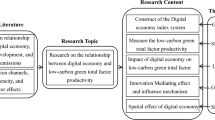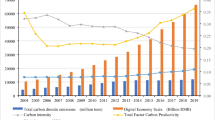Abstract
This research focuses on the impact of the digital economy on total factor carbon productivity. Based on the panel data of China’s provinces from 2009 to 2019, this paper incorporates undesired output, namely carbon emissions, into the evaluation index system, and uses the SBM-ML index to measure regional total factor carbon productivity, and uses the RAGA-PP model to measure the digital economy development index, which includes three dimensions: digital infrastructure, digital industry development, and digital economic environment. Moreover, this paper incorporates the heterogeneous threshold of technological accumulation into the framework of the impact mechanism of total factor carbon productivity and builds a threshold model to examine the impact of the digital economy on total factor carbon productivity under different technological accumulation thresholds. The research shows that, first, during the sample period, total factor carbon productivity fluctuated around the frontier, showing a certain upward trend, with significant regional heterogeneity. Second, the digital economy has a promotional effect on the total factor carbon productivity level in China and can become the new energy for the country to improve the level of green development. Third, the impact of the digital economy on total factor carbon productivity presents a significant heterogeneous threshold effect of technological accumulation, along with the increasing level of technology accumulation, the effective coefficient of the digital economy on total factor carbon productivity is increasing, and the level of significance is increasing. Last, the low-carbon driving mechanism of the digital economy has temporal and spatial heterogeneity of regional technology accumulation levels. The conclusions of this paper provide an effective reference for exploring the realization mechanism of regional total factor carbon productivity improvement, ecological civilization construction, and high-quality economic development.





Similar content being viewed by others
Data Availability
All data can be downloaded from China’s National Bureau of Statistics.
References
Alharthi M, Dogan E, Taskin D (2021) Analysis of CO2 emissions and energy consumption by sources in MENA countries: evidence from quantile regressions. Environmental Science and Pollution Research, 1–8.
Amri F, Zaied YB, Lahouel BB (2019) ICT, total factor productivity, and carbon dioxide emissions in Tunisia. Technol Forecast Soc Chang 146:212–217
Amuso V, Poletti G, Montibello D et al (2020) The Digital Economy: Opportunities and Challenges[J]. Global Pol 11(1):124–127
Anser MK, Alharthi M, Aziz B et al (2020a) Impact of urbanization, economic growth, and population size on residential carbon emissions in the SAARC countries. Clean Technol Environ Policy 22(4):923–936
Anser MK, Hanif I, Alharthi M et al (2020) Impact of fossil fuels, renewable energy consumption and industrial growth on carbon emissions in Latin American and Caribbean economies. Atmosfera 33(3):201–213
Aral S, Brynjolfsson E, Van Alstyne MW (2012) Information, technology and information worker productivity. Inf Syst Res 23(3):829–867
Audretsch DB, Heger D, Veith T (2015) Infrastructure and entrepreneurship. Small Bus Econ 44(2):219–230
Bai XJ, Sun XZ (2021) Impact of internet development on total factor carbon productivity: induced by cost, innovation, or demand? China Popul Resour Environ 31(10):105–117
Berkhout F, Hertin J (2004) De-materialising and re-materialising: digital technologies and the environment. Futures 36(8):903–920
Bertschek I, Fryges H, Kaiser U (2006) B2B or not to be: does B2B E-commerce increase labour productivity? Int J Econ Bus 13(3):387–405
Boeing P, Mmller E, Sandner PG (2015) China’s R&D explosion analyzing productivity effects across ownership types and over time. SSRN Electronic Journal.
Bukht R, Heeks R (2017) Defining, conceptualising and measuring the digital economy. GDI Development Informatics Working Papers, No. 68
Cai YZ, Ma WJ (2021) How data influence high-quality development as a factor and the restriction of data flow. J Quantitative Technical Econ 38(03):64–83
Cantwell J, Tolentino PE (1990) Technological accumulation and third world multinationals. Discussion Paper in International Investment and Business Studies, No 139.
Chen B, Liu T, Guo L et al (2020) The disembedded digital economy: social protection for new economy employment in China[J]. Soc Pol Adm 54(7):1246–1260
Cheng LL (2018) Study on the impact of multi-dimensional urbanization on agricultural carbon productivity and its regional differentiation: An empirical study based on SFA, entropy index and SDM. J Cent South Univ (Soc Sci) 24(05):107–116
Chung Y, Fare R, Grosskopf S (1997) Productivity and undesirable outputs: a directional distance function approach. J Environ Manage 51(3):229–240
Curran D (2018) Risk, innovation, and democracy in the digital economy[J]. Eur J Soc Theory 21(2):207–226
David JM, Hopenhayn HA, Venkateswaran V (2016) Information, misallocation, and aggregate productivity. Quart J Econ 131(2):943–1005
Ding ZF (2020) Research on the mechanism of digital economy driving high-quality economic development: a theoretical analysis framework. Mod Econ Res 01:85–92
Du KR (2019) Li JL (2019) Towards a green world: how do green technology innovations affect total-factor carbon productivity. Energy Policy 131:240–250
Glavas C, Mathews S (2014) How international entrepreneurship characteristics influence Internet capabilities for the international business processes of the firm. Int Bus Rev 23(1):228–245
Gnezdova JV, Khoroshavina NS, Lebedeva NE (2019) The impact of the industry digitization on the economic development of the country. Amazonia Inv 8(21):633–643
Guire TM, Manyika J, Chui M (2012) Why big data is the new competitive advantage. Ivey Bus J 7–8:1–13
Guo H, Lian YY (2020) Digital economy and the cultivation of new kinetic energy of China’s future economy. J Northwest Univ 50(01):65–72
Guo JT, Luo PL (2016) Does the Internet promote China’s total factor productivity? Manage World 10:34–49
Han B (2021) Research on the influence of technological innovation on carbon productivity and countermeasures in China. Environ Sci Pollut Res 28(13):16880–16894
Hansen BE (1999) Threshold effects in non-dynamic panels: estimation, testing, and inference. J Econ 93:345–368
Hou TL (2010) Reinterpretation of the financial crisis: analysis of Marx’s theory of the economic cycle. Financ Econ 12:19–25
Hou XC, Zhou JJ, Zhang L (2021) Construction and measurement of China’s comprehensive energy dependence index. Energy Rep 7:4516–4529
Ji XY (2020) Research on the impact of central China’s rising strategy on urban environmental quality—an analysis based on PSM-DID method. Inq into Econ Issues 08:157–169
Jing WJ, Sun BW (2019) Digital economy promotes high-quality economic development: a theoretical analysis framework. Economist 02:66–73
Kaya Y, Yokobori K (1997) Environment, energy and economy: strategies for sustainability. United Nations University Press, Tokyo
Khitskov EA, Veretekhina SV, Medvedeva AV et al (2017) Digital transformation of society: problems entering in the digital economy[J]. Eurasian J Anal Chem 12(5B):855–873
Li XH (2019) New features and the formation mechanism of new growth drivers of digital economy. Reform 11:40–51
Li XP, Yu DS (2020) Yu JJ (2020) Spatial spillover effect of heterogeneous environmental regulations on carbon productivity-spatial Durbin model. Chin Soft Sci 04:82–96
Li YJ, Zhang L, Zhao LD (2016) China’s clean energy use, factor allocation structure and carbon productivity growth based on production function with energy and human capital. Res Sci 38(04):645–657
Liang Q, Xiao SP, Li MX (2021) Has the development of digital economy improved urban ecological efficiency? Based on the perspective of industrial structure upgrading. Inq into Econ Issues 06:82–92
Liu CJ, Hu W (2016) FDI enhances carbon productivity in China? Empirical analysis of spatial durbin model. World economy studies (01):99–109+137
Liu F, Tang L, Liao KC et al (2021) Spatial distribution and regional difference of carbon emissions efficiency of industry energy in China. Scientific Reports 11(1):19419
Liu SC (2019) Targeting path and policy supply for the high-quality development of China’s digital economy[J]. Economist 06:52–61
Liu TK, Chen JR, Huang CCJ et al (2013) E-commerce, R&D, and productivity: firm-level evidence from Taiwan. Inf Econ Policy 25(4):272–283
Markovic DS, Zivkovic D, Cvetkovic D et al (2012) Impact of nanotechnology advances in ICT on sustainability and energy efficiency. Renew Sustain Energy Rev 16(5):2966–2972
Ojanper S, Graham M, Zook M (2019) The digital knowledge economy index: mapping content production[J]. J Dev Stud 55:2626–2643
Qi SZ, Li Y (2018) Threshold effect of renewable energy consumption on economic growth under the energy transition. China Popul Resour Environ 28(02):19–27
Shao S, Zhang K, Dou JM (2019) Effects of economic agglomeration on energy saving and emission reduction: Theory and empirical evidence from China. Management World 35(01):36–60+226
Sun J (2020) From digital economy to digital trade: connotations, features, rule setting and impacts. Int Econ Trade Res 36(05):87–98
Tapscott D (1996) The digital economy: promise and peril in the age of networked intelligence [M]. McGraw-H, New York
Viollaz M (2019) Information and communication technology adoption in micro and small firms: can internet access improve labor productivity? Dev Pol Rev 37(5):692–715
Vu KM (2013) Information and communication technology (ICT) and Singapore’s economic growth. Inf Econ Policy 25(4):284–300
Wang W (2020) Does industrial intelligence promote high-quality employment in the digital economy era. Economist 04:89–98
Wang SN, Chen JS (2019) The techno-economic paradigm of digital economy. Shanghai J Econ 12:80–94
Wang JX, Wang SY (2016) Can social capital, technology innovation break resource curse: based on panel threshold effect. Econ Res J 51(12):76–89
Wang W L, Jing W. (2019) Research on trend and policy of digital economy development in China. Economic Review Journal.
Wu YQ, Zhang X (2022) Evaluation on the green development of provincial economy in china—based on the perspective of green total factor productivity. J Hebei Univ Econ Bus 43(01):67–81
Xiao G, Zhang L, Business SO (2019) Research on the influence of digital economy development on regional total factor productivity in China[J]. J Hefei Univ Technol (social Sciences) 33(05):6–12
Xie J (2019) Research on human capital mismatch across provinces in China. Chinese Journal of Population Science (06):84–96+128
Yang Z, Shi Y, Yan H (2017) Analysis on pure E-commerce congestion effect, productivity effect and profitability in China. Socioecon Plann Sci 57:35–49
Yang Z, Abbas Q, Hanif I, Alharthi M, Taghizadeh-Hesary F et al (2021) Short- and long-run influence of energy utilization and economic growth on carbon discharge in emerging SREB economies. Renewable Energy 165(1):43–51
Yi XR, Chen YY, Wei YS (2019) Research on several major theoretical issues about the digital economy-based on the general analysis of modern economics. Economist 07:23–31
Zhang J, Wu GY, Zhang JP (2004) The estimation of China’s provincial capital stock: 1952–2000. Econ Res J 39(10):35–44
Zhang JP, Cheng MW, Pan H (2018) Research on the threshold effect of internet’s spillover effect on economic growth. Soft Science 32(09):1–4
Zhang XW (2019) Research on evolution of innovation model under the condition of digital economy. Economist 7:32–39
Zhao T, Zhang Z, Liang SK (2020) Digital economy, entrepreneurship, and high-quality economic development: empirical evidence from urban China. Manage World 36(10):65–76
Acknowledgements
We are very grateful to editors and anonymous reviews for reviewing this paper.
Funding
This work was financially supported by the Humanities and Social Science project of Shandong Province (2021-ZXCY-16) and Social Science Planning Project of Shandong Province (21CPYJ21).
Author information
Authors and Affiliations
Contributions
Conceptualization: Dongri Han, Yingying Ding; methodology: Dongri Han, Ziyi Shi; software: Dongri Han; writing-original draft: Ziyi Shi, Yao He; writing—review and editing: Dongri Han, Ziyi Shi; funding acquisition: Yingying Ding; resources: Yingying Ding; supervision: Dongri Han.
Corresponding author
Ethics declarations
Ethics approval
Not applicable.
Consent to participate
Not applicable.
Consent for publication
Not applicable.
Conflict for publication
Not applicable.
Conflict of interest
The authors declare no conflict of interest.
Additional information
Responsible Editor: Eyup Dogan
Publisher's note
Springer Nature remains neutral with regard to jurisdictional claims in published maps and institutional affiliations.
Rights and permissions
About this article
Cite this article
Han, D., Ding, Y., Shi, Z. et al. The impact of digital economy on total factor carbon productivity: the threshold effect of technology accumulation. Environ Sci Pollut Res 29, 55691–55706 (2022). https://doi.org/10.1007/s11356-022-19721-x
Received:
Accepted:
Published:
Issue Date:
DOI: https://doi.org/10.1007/s11356-022-19721-x




